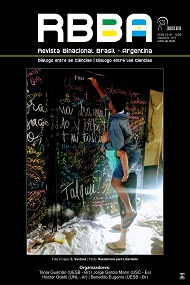TRAZOS PARA ESBOZAR LA INCLUSIÓN DE LA EDUCACIÓN SEXUAL INTEGRAL EN LOS PROFESORADOS DE BIOLOGÍA. RECUPERANDO LAS VOCES DEL ESTUDIANTADO
DOI:
https://doi.org/10.22481/rbba.v9i1.6958Resumo
O ensino na educação superior está atravessado por ditos sobre a sexualidade: falam as ciências, a didática, desde práticas cotidianas como a distribuição de espaços, a legitimação da divisão desigual do poder, a disciplina de corpos, etc. Paradoxalmente, é reconhecida a ausência da Educação Sexual Integral que possibilite desconstruir o sexismo, possibilite o empoderamento em direitos sexuais e fortaleça a cidadania sexual do estudantado. O propósito deste artigo é oferecer argumentos que justifiquem a inclusão da Educação Sexual Integral, na trajetória da formação de estudantes dos cursos de professorado de Biologia, tanto de nível superior universitário como não-universitário. Nesta oportunidade, são apresentadas as vozes dos estudantes destas carreiras, resgatadas a partir de abordagens quantitativas e qualitativas. Entre outras contribuições, a pesquisa permitiu reconhecer alguns argumentos discursivos associados ao campo disciplinar que continuam tendo força real e que requerem ser revisados em termos de estudos de género. Outros resultados são sintetizados em ideias para a inclusão curricular da Educação Sexual em nível. Por fim, são apresentadas reflexões para a construção de uma pedagogia da sexualidade na formação de pesquisadores. Esta apresentação é o avanço de uma pesquisa mais ampla envolvendo outros atores e estratégias metodológicas.
Downloads
Referências
BERSTEIN, B. Poder, educación y conciencia. España, El Roure, 1990.
BRITZMAN, D. ¿Qué es esa cosa llamada amor? En Britzman, D., Flores, V. y Hooks, B. Pedagogías trasgresoras. Argentina, 1era reimpresión, 2018.
CERLETTI, A. Repetición, novedad y sujeto en la educación. Un enfoque filosófico y político. Buenos Aires. 1era. Ed. Argentina, Del Estante, 2008.
CAMPUS EDUCATIVO DE LA PROVINCIA DE SANTA FE. Disponible en: https://campuseducativo.santafe.gob.ar/blog/educacion-sexual-integral/Acceso en: 22/02/2020.
CONNEL, R. Escuela y justicia social. 3era. ed. Madrid, Morata, 2006.
DISEÑO CURRICULAR EDUCACIÓN SECUNDARIA ORIENTADA PROVINCIA DE SANTA FE 2014. Disponible en: https://www.santafe.gov.ar/index.php/educacion/content/download/218364/1135170/file/Anexo%20III%20Resol%202630-14.pdfAcceso en: 22/02/2020.
FAUSTO STERLING, A. Cuerpos sexuados. 1era. Ed. España, Melusina, 2006.
FLICK, U. Introducción a la investigación cualitativa. 1era. Ed. España. Morata. 2004.
FOX KELLER, E. Lenguaje y vida; metáforas de la Biología en el siglo XX. 1era. Ed. Argentina. Manantial, 2000.
FOUCAULT, M. Historia de la Sexualidad I. La voluntad de saber. 31 ed.Madrid. Siglo XXI, 2007.
______. Historia de la locura. 2da Reimpresión. Colombia, FCE, 1998.
______. La arqueología del saber. 15º ed. México, Siglo XXI Editores, 1991.
GONZÁLEZ DEL CERRO, C. y BUSCA, M. Más allá del sistema reproductor. Aportes para la enseñanza de la biología desde la perspectiva de género. 1era. Ed. Argentina. Homo Sapiens, 2017.
GORE, J. M. Controversias entre las pedagogías. Madrid, Morata, 1996.
GVIRTZ, S. Del curriculum prescripto al curriculum enseñado. Una mirada a los cuadernos de clase. 1era. Ed. Argentina. Aique, 1997.
HARAWAY, D. Ciencia, cyborgs y mujeres. La reivindicación de la naturaleza. España. Cátedra, 1995.
HOOK, B. Eros, erotismo y proceso pedagógico. En Britzman, D., Flores, V. y Hooks, B. Pedagogías trasngresoras. 1era reimpresión. Argentina, Bocavulvaria Ediciones, 2018.
KOROL, C. (comp). Feminismos populares. Pedagogías y políticas. 1era. Ed. Argentina, Chirimbote, 2016.LOPES SOUZA, M. y MOREIRA CRUZ, L. Pedagogização de gêneroe da sexualidade na formaçãoinicial. Tensoes na practica pedagogica de uma docente universitaria. Em DA SILVA, K., FERRARI, A. y LOPES SOUZA, M., “Tecer e entretecer a vida. Sexualidades, género ediferençasnaformaçãodocente. 1era. Ed. Minas Gerais, Editora UEMG, 2017. Cap 1, p. 15 a 31.
LOPES LOURO, G. Gênero, sexualidade e educacão. Uma perspectiva pós-estructuralista. 16 ed. Brasil, Editora Vozes, 2014.
MARRADI, A, ARCHENTI, N y PIOVANI, J. Metodología de las ciencias sociales. 1era. Ed. Argentina. Emecé, 2007.
MAFFIA, D. Hacia una pedagogía feminista. Géneros y educación popular. 1era. Ed. Argentina, Pañuelos en Rebeldía, 2007.
MC LAREN, P. La experiencia del cuerpo posmoderno: la pedagogía crítica y las políticas de la corporeidad, en ALBA, A. (comp). Posmodernidad y educación. 1era. Ed.México, UNAM, 1995. p. 265 a 313.
MORGADE, G. Toda educación es sexual. 1era. Ed. Argentina, La Crujía ediciones, 2011.
______. Educación sexual integral con perspectiva de género. La lupa de la ESI en el aula.1era. Ed. Argentina, Homo Sapiens, 2016.
PAGURA, F., RODRIGUEZ, S. Y FACCIOLLI, M. Enseñar desde los márgenes: las optativas como cuarto propio de la perspectiva de género en la Universidad, En: XII JORNADAS NACIONALES DE HISTORIA DE LAS MUJERES Y VIII CONGRESO IBEROAMERICANO DE ESTUDIOS DE GÉNERO, Mesa 69. Universidad de Buenos Aires, julio 2017.
ORGANIZACIÓN MUNDIAL DE LA SALUD (OMS)ORGANIZACIÓN PANAMERICANA DE LA SALUDORGANIZACIÓN PANAMERICANA DE LA SALUD. Actas de la Reunión de Consulta organizada por la OMS, la OPS y la WAS. Guatemala, 2000.
PLAN DE ESTUDIO PROFESORADO DE BIOLOGÍA PARA LA ENSEÑANZA SECUNDARIA N°2090/2015. Ministerio de Educación de la Provincia de Santa Fe.
PRECIADO, B. Testo Yonqui. Sexo, drogas y biopolítica. 1era. Ed. Argentina. Paidós, 2008.
RUBIN, G. Reflexionando sobre el sexo: notas para una teoría radical de la sexualidad, en VANCE, C. (comp). Placer y peligro. Explorando la sexualidad femenina.España, Revolución, 1989.
SOUZA SANTOS, B. Hacia una epistemología del sur.1era. Ed. Argentina, Siglo XXI, 2009.
TAYLOR, S. y BOGDAN, R. Introducción a los métodos cualitativos de investigación. España. Paidós, 1987.
SILVA,T.da.Identidade e diferença. Petrópolis, Editora Vozes, 2000.
VASILACHIS DE GIALDINO, I. Estrategias de investigación cualitativa. 1era ed. España, Gedisa. 2006.
ZATTARA, S. Formación ética y ciudadana con justicia de género y ética social. 1era. Ed. Rosario Homo Sapiens. 2018.






